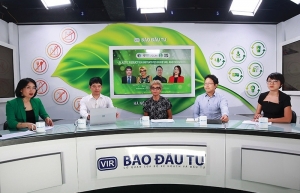Setting benchmarks for sustainability
Even more alarming is that nearly half a million tonnes of this waste finds its way into the ocean, making Vietnam one of the world’s major contributors to global plastic pollution. Plastic that ends up in the ocean is the worst form of plastic mistreatment, as it permanently damages the marine ecosystem and has implications on human health as well.
 |
| Joel Tasche, CEO and co-founder, CleanHub (left) and Rex King, Investments, Integra Partners |
The question arises: what steps can we take to address ocean pollution? While there have been previous initiatives aimed at mitigating the environmental impact of consumer habits, the development of the extended producer responsibility (EPR) legal framework in Vietnam stands out in particular. EPR places the responsibility for the end-of-life collection, treatment, and disposal of goods back on the producer.
This approach was first introduced in Sweden in the 1990s, with other European countries becoming early adopters. Although these European countries witnessed notable success in waste management, particularly in plastics, contributing only 0.6 per cent to ocean pollution, it is vital to recognise that many of these countries were able to comply with such regulations by exporting their waste to emerging nations like those in Asia, where waste disposal laws are more lax.
Vietnam, for instance, received more than 120,000 metric tonnes of plastic waste exports from the European Union in 2021 alone. This underscores the significance of Vietnam having a well-established EPR and waste management programme.
With the introduction of the new Law on Environmental Protection and guiding documents, manufacturers and importers of certain types of products and packaging in Vietnam have been expected to comply with certain EPR requirements from 2022.
As the EPR framework in Vietnam continues to develop, Vietnam is in a prime position to take the best learnings from global policies and leapfrog its own efforts to devise a framework that suits the country’s needs and aspirations. In addition, this can serve to position Vietnam as being a leader in sustainability by establishing new benchmarks for similar economies in the region.
One critical shortcoming of existing EPR policies globally is the opacity of its enforcement and ensuring adherence. With that, startups have spotted this short-coming and have emerged to provide the necessary technologies to fill in this gap.
For one, a track-and-trace provider named CleanHub is partnering with other Southeast Asian countries to solve traceability of trash. To be a global leader in EPR policies, Vietnam’s Ministry of Natural Resources and Environment could consider deepening their engagement with ecosystem players to identify new opportunities.
Translating these guidelines and principles into a digital platform will significantly enhance the effectiveness and adoption of EPR.
Based on learnings from other global policies, there are other key considerations for major stakeholders in the development of an effective policy.
Participants in the system
Vietnam is the manufacturing hub of Southeast Asia, with this sector contributing 23 per cent to the country’s GDP. By implementing an EPR framework, the Vietnamese government has the opportunity to safeguard its citizens from pollution generated by the manufacturing of goods.
This opportunity shoulders even greater importance because Vietnam produces goods for its own population, as well as for foreign export, attracting more than $16.2 billion in foreign direct investment in 2023 alone. An effective EPR policy for Vietnam would require clear guidelines for its manufacturing sector, sufficient resources for policy implementation, as well as considered compliance and enforcement provisions in order to be effective.
At the heart of Vietnam’s economic success lies in its local companies and businesses, which would, under the new framework, bear the primary responsibility of effective waste management for the goods they produce. In more established systems, like those in Europe, this comes in the form of bearing waste disposal fees, ensuring that the end-of-life products are dealt with in accordance with best practices and other environmental laws.
However, a critical problem arises where there is no mechanism for proving that the waste is, in fact, effectively managed and in turn, this lack of transparency makes companies less likely to comply with EPR policies as there is no effective way to justify the spend. Are the waste materials being incinerated, recycled, or shipped to another country? Companies rightfully deserve to have clarity on the handling of their financial contributions.
An effective policy must therefore consider how to make compliance more attractive for companies. Our view is that a transparent model would encourage companies to comply with the EPR framework in Vietnam, offering tangible justification for their spend, peace of mind for their practices, as well as potentially far-reaching economic benefits, such as developing a secondary market for used recycled or refurbished materials. This integrated approach would foster both environmental responsibility and economic viability.
With a well-considered EPR policy, Vietnam is also in a position to significantly benefit its informal waste management participants, informal waste workers who make their income from collecting and recycling waste. They are often the largest contributors to cleaning an otherwise ineffective waste management system, as they do the unglamourous work of collecting, sorting, and recycling waste from landfills and streets, but whose efforts are often overlooked because they occur in the background.
A well-rounded EPR policy would make for a more organised and regulated system for collecting and managing waste materials, which could create opportunities for waste pickers to participate in more formal recycling networks, remove the stigma of working with waste while allowing such workers to gain access to safer working conditions, better wages, and opportunities for skill development.
By integrating these informal workers into the formal recycling sector, EPR would contribute to their economic wellbeing and improve their overall quality of life.
Meanwhile, among all the various stakeholders, citizens stand to gain the most from the implementation of an effective EPR policy which would foster a cleaner and healthier society and enrich the local ecosystem, benefiting both residents and visitors.
As consumers, they are often first-line participants in the country’s waste management system, with waste-sorting and recycling efforts that begin in the home. As such, they too stand to benefit from a policy that makes waste management practices more transparent and accountable, with tangible results for their efforts serving as powerful incentives for more sustainable practices.
When it comes to the use of plastics, EPR policies have proven to reduce environmental impact and promote more sustainable practices, however implementation and enforcement of EPR policies remains problematic due to substandard reporting and transparency. Up to now, companies that pay to offset the impact of their plastic waste have no way of proving the impact of their contributions.
Organisations such as CleanHub, with its advanced AI-assisted technology that checks and balances the amount of waste collected at every point of the value stack, aims to address this issue by providing a platform solution capable of orchestrating all waste management stakeholders, to deliver the most advanced track and trace capabilities along the post-consumer lifecycle.
How does CleanHub work?
The German climatetech startup enables consumer brands to purchase plastic credits from waste managers in markets such as India, Indonesia, and Cambodia. In addition to verifying how each piece of post-consumer plastic is treated on behalf of consumer brands, CleanHub also acts as a clearing house, a proverbial middle-man, that holds funds from the plastic credits sold in escrow for waste management operators until their efforts can be verified to ensure true accountability.
Among the various types of waste in Vietnam, CleanHub prioritises non-recyclable plastic which constitutes 91 per cent of total plastic waste, and is the primary contributor to ocean pollution.
With operations in India, Indonesia, and Cambodia, the company can effectively book-keep waste, ensuring that efforts are accurately documented through AI and their WasteOS software. To date, CleanHub has helped waste management operators collect and properly process more than six million kg of plastic waste.
With the development of Vietnam’s EPR framework, CleanHub and other startups in this ecosystem present a strategic opportunity for the country to leapfrog existing models and effectively address some of the system’s most widely recognised shortcomings - namely, transparency and accountability.
This bodes well not just for economic growth and environmental conservation, but also paves the way for Vietnam to build a truly circular economy for plastics while the country transitions away from its reputation as a top polluter to establishing new standards upon which future EPR policies in the region will be modelled after.
 | Applying popular new methods to combat single-use plastic habit Since 2020, the Institute of Strategy and Policy on Natural Resources and Environment (ISPONRE) has introduced a number of different matters, and the most important is to apply a circular economy and try to reduce, reuse, and recycle all materials and to reduce waste in the environment. |
 | Green budgeting an investment for the future At the second panel of the 'Sustainable Development 2023' forum organised by VIR on November 16, experts shared their comprehensive action plans for advancing sustainable practices. |
What the stars mean:
★ Poor ★ ★ Promising ★★★ Good ★★★★ Very good ★★★★★ Exceptional
Related Contents
Latest News
More News
- Internal strengths attest to commitment to progress (February 19, 2026 | 20:13)
- Vietnam, New Zealand seek level-up in ties (February 19, 2026 | 18:06)
- Untapped potential in relations with Indonesia (February 19, 2026 | 17:56)
- German strengths match Vietnamese aspirations (February 19, 2026 | 17:40)
- Kim Long Motor and AOJ Suzhou enter strategic partnership (February 16, 2026 | 13:27)
- Haiphong welcomes long-term Euro investment (February 16, 2026 | 11:31)
- VIFC in Ho Chi Minh City officially launches (February 12, 2026 | 09:00)
- Norfund invests $4 million in Vietnam plastics recycling (February 11, 2026 | 11:51)
- Marico buys 75 per cent of Vietnam skincare startup Skinetiq (February 10, 2026 | 14:44)
- SCIC general director meets with Oman Investment Authority (February 10, 2026 | 14:14)

 Tag:
Tag:
















 Mobile Version
Mobile Version